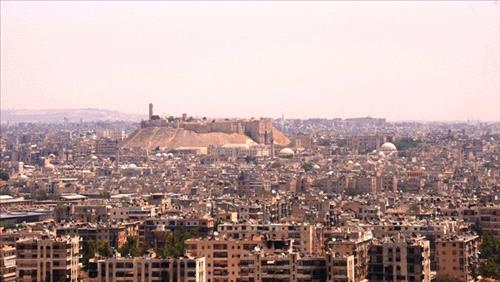Ammon News - (Associated Press) - More than two years of fighting in Syria’s civil war has damaged some 9,000 state buildings and run up $15 billion in losses to the public sector, a government minister said Sunday, shining a light on the devastating toll the crisis has taken on the country’s economy.
Syria’s civil war has laid waste to entire neighborhoods in the country’s cities and towns, destroyed much of its manufacturing base and infrastructure and brought oil production and exports to a halt. The damage to the nation’s human resources has been just as severe. More than a million people have fled the country and millions more are displaced within it. According to a U.N. estimate, more than 93,000 people have been killed.
In comments published in Syrian newspapers, Local Administration Minister Omar Al Ibrahim Ghalaounji said the $15 billion in damages to the public sector were sustained between March 2011, when the uprising against President Bashar Assad began, and March 2013. He said they were the result of “terrorist attacks on government buildings and infrastructure.”
The government commonly refers to those fighting to topple the Assad regime as “terrorists.”
Former Syrian Planning Minister Abdullah al-Dardari, who leads a six-member U.N. team drawing up a comprehensive postwar reconstruction plan, recently estimated the overall damage to Syria’s economy at $60-$80 billion.
He told The Associated Press that Syria’s economy has shrunk by about 35 percent, compared to the 6 percent annual growth Syria enjoyed in the five years before the conflict began. The economy lost almost 40 percent of its GDP, and foreign reserves have been extensively depleted, he said.
Unemployment has shot up from 500,000 before the crisis to at least 2.5 million this year, he said.
Syria’s currency plunged to a record low this month following a U.S. decision to arm rebel groups. The Syrian pound currently trades around 200 to the dollar, compared with 47 before the crisis.
When the conflict began, the government had some $17 billion in foreign currency reserves. Those have dropped from blows to two main pillars of the economy: oil exports, which used to bring in up to $8 million per day, and tourism, which in 2010 earned $8 billion. U.S. and European Union bans on oil imports are estimated to cost Syria about $400 million a month.
The government did not say how much currency it has left in its reserves, but the London-based Economist Intelligence Unit estimates it at a little more than $4.5 billion.
After the currency dive, Iran - one of Assad’s strongest allies believed to have supplied his government with billions of dollars since the crisis began - quickly stepped in, offering a $1 billion credit line to help shore up the pound.
The weak pound has triggered a hike in prices, squeezing a Syrian population already beleaguered by the fighting.
Powdered milk is selling at 190 pounds, less than a $1 at prevailing prices, up from 60 pounds before the crisis. The price of an 18-liter (5-gallon) jug of olive oil jumped from 3,600 pounds two years ago to 14,000 pounds on Sunday, while a kilogram of meat currently sells at 1,300 pounds, three times the price before the conflict.
To compensate people, a presidential decree last week offered a raise for the public sector, saying it could reach up to 40 percent depending on the salary of the civil servant. Pensions could also rise by up to 25 percent, the decree said.
Many Syrians complain they can barely make ends meet.
“Living in Syria is like being in a burning hell,” a Damascus resident said Sunday via Skype. He identified himself only as Abu Khaled, fearing government retribution. “It’s the rising prices on the one side, the war on the other, and in between killings and kidnappings, lack of security and bombs and rockets falling on our heads and homes.”
In the long-run, the economic pinch could hamper the Assad regime’s ability to fund his efforts to quell the armed rebellion.
In recent weeks, however, government forces - bolstered by an influx of fighters from Lebanon’s Hezbollah militant group - have clawed back ground lost to rebels over the past year, most importantly the strategic town of Qusair near the Lebanese border.
With Qusair now in government hands, an emboldened military is seeking to retake rebellious neighborhoods in the nearby city of Homs, Syria’s third largest and a flashpoint since the early days of the uprising.
On Sunday, Syrian warplanes shelled the old quarters of Homs, killing one woman and two children, according to the Britain-based Syrian Observatory for Human Rights and two activists who spoke to The Associated Press on Skype.
“They have wiped half the city off the map,” said an activist who uses the name Abu Bilal. He and activist Tariq Badrakhan said it was the heaviest shelling of Homs since rebels seized control of parts of the city over a year ago.
Syrian forces also tried to push into the city from the Babout quarter, but fighters of the al-Qaida affiliate Jabhat al-Nusra pushed them back, Abu Bilal said. The activists said at least five Syrian soldiers and Hezbollah fighters were killed.
In the northern province of Aleppo, Syrian rebels shot down a helicopter flying over the town of Kufr Nabel, sending it crashing in a fiery ball, according to activists and state media.
Seven people were killed, most of them education officials flying in exam papers, state media said.
In a video posted online, a voice can be heard shouting “God is great” as an aircraft emitting plumes of smoke is seen smashing into a plain scattered with homes. The video corresponded to other AP reporting of the events depicted.
